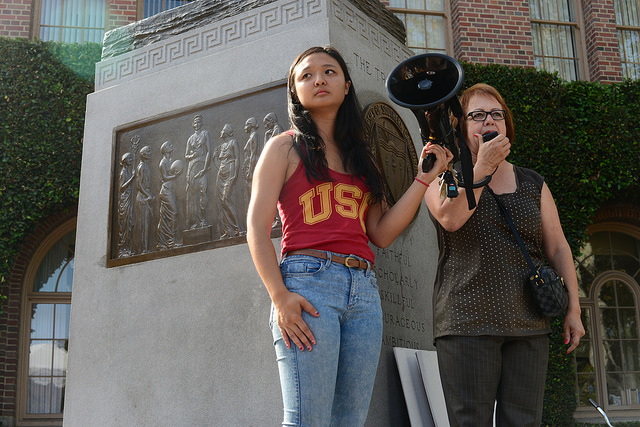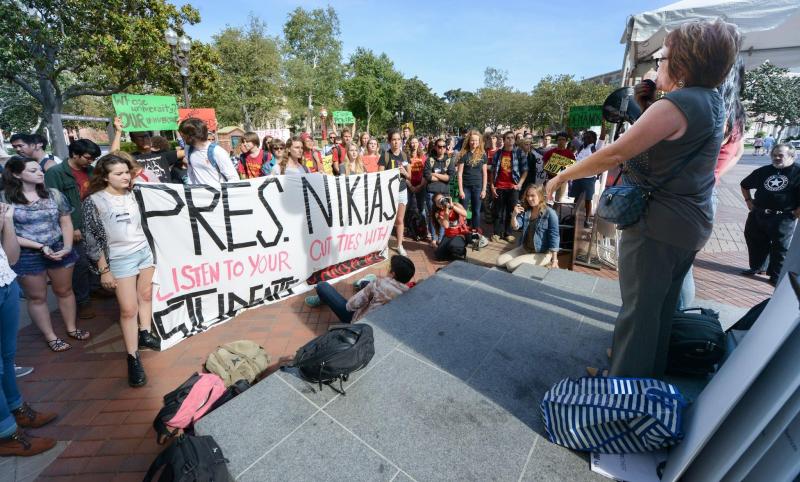Los Angeles Labor Leader Maria Elena Durazo Supports USC Student Protesters

Durazo commended the students’ ongoing protests blasting USC’s business partnership with JanSport, a firm accused of cultivating direct ties with Bangladeshi sweat shops.
“This university has a responsibility to be a good partner to people no matter what part of the world they are in,” she yelled. “And what you’re asking is something we started a few years ago, when we said students have the right to speak up peacefully and expect their administration to listen and do something.”
The support of the head of L.A. County's labor movement sends a powerful message that USC’s administration should not ignore the 60 USC students from the Student Coalition Against Labor Exploitation and other groups demanding responsible social action for labor rights. The 60-year-old Durazo carries the clout of the Federation, which is the central labor council in Los Angeles that oversees most unions. Developers, politicians and anyone hoping to build anything in this city first have to get the Fed's approval and promise to create union jobs. Durazo is widely known as the city's top power broker, and is skilled at creating coalitions to drive labor movements. Her federation also helped elect about two-thirds of L.A.'s 15-member City Council, and unions' desires do not often get turned down.
SEE ALSO: USC Student Protesters Rally Against University Policies
Seeing the barely 5-foot, auburn-haired union leader call out one of Los Angeles' most expensive and powerful universities should remind its elusive president that USC's actions, practices and policies are not autonomous, and that he is being watched by one of the most influential people in Los Angeles, whose home union represents a collection of USC's food workers.
Stepping down from the bronze steps and shielding her eyes from the afternoon sun, the labor leader called fighting for workers’ rights an “L.A. tradition,” one steeped in gathering and magnifying the scattered voices of often-ignored minority groups, low-wage workers, and, today, she says, USC students.
"This is fantastic because it is what’s behind it is the heart and soul of makes a social justice movement,” said Durazo. “Everyone has a role, a responsibility, and the administration should respond to its students.”

Sarah Newell, one of the lead organizers in the day’s events, said the university’s intimidation tactics infuriated students.
Newell calls the school’s dismissive, autocratic attitude “unacceptable.” “We’ve sent them hundreds of pages of research, talked with them for hours, delivered 13 letters, and collected 852 community votes from USC students to end this—all things they’ve ignored,” said Newell.
Durazo smirked knowingly when asked about the University’s response to last week’s sit-in.
“Obviously their response is terrible. and this university should know better because it’s in the middle of a community where through organizing, through protest, we have won better working conditions,” she said. “What is the point of resisting something like this?”
SEE ALSO: USC Students Protest In President's Office Over Ties With JanSport
L.A.’s most powerful labor leader is no stranger to prodding top politicians and corporations to alter labor laws. She has been pushing Los Angeles to increase the pay for hotel workers, and the city’s minimum wage, for years. She organizes thousands of volunteers across a wide array of unions, and addresses politicians and restaurant workers with the same energetic, bullish attitude.
Dan Schnur, who is on leave as director of the Jesse M. Unruh Institute of Politics at USC, calls Durazo the “single most influential individual in Los Angeles politics.” Before leading the Federation, Durazo was elected President of the hotel workers union, UNITE-HERE Local 11, and transformed it into one of the most active unions in the county. She was the first Latina elected to the Executive Board of HERE International Union in 1996, and took charge of the Federation in 2006.
She reminds USC students that change cannot occur without risk.
“Even in the face of threats, stand up peacefully and powerfully,” she advised the young crowd.
Her greatest legacy, she says, was fighting for Latino workers in the hotel and restaurant union she ran for nearly two decades. Harvesting crops in California’s central valley with her 10 other brothers and sisters for mere pennies, she vowed to keep fighting the exploitation of workers. “There are so many low-wage campaigns needing attention.”
She ticks them off: car wash workers, sanitation workers, hotel workers, airport passenger service workers, construction workers, immigration reform, and the endless fight to increase the state's $8 minimum wage to some $15 an hour.
Critics liken Durazo to a political chess player, leveraging different politicians and levels of government to organize movements in different L.A. industries. She and other union members spent millions on the failed campaign of mayoral candidate Wendy Greuel. The city’s former city controller had strong ties to union leaders.
Many voters aren’t comfortable with unions’ tight grip over most of L.A.’s leaders, but Durazo said L.A.’s residents should be proud of the city’s reputation as a union town.
That’s how justice happens,” she said. “And I am glad to see at USC’s campus students are uniting. Keep up the fight because through organization, we have won.”



